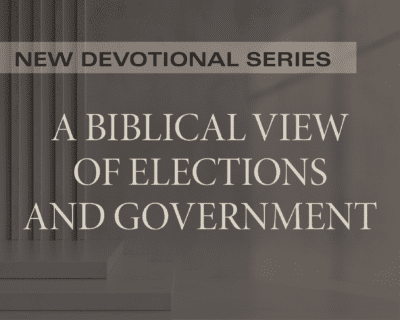Get clear on what Christian meditation is, and learn how to meditate on the Bible in four easy ways.
“May the words of my mouth and the meditations of my heart be pleasing in your sight, O Lord, my Rock and my Redeemer.” – Psalm 19:14
“… out of the fullness of the heart the mouth speaks.” – Matthew 12:34
There is a strong connection between what we think deeply about and what we talk much about. The more you think about something, the more you’ll talk about it. Jesus said very plainly to the Pharisees that it was impossible for them to say anything good, “for out of the fullness of the heart, the mouth speaks.” When you store up treasures in your heart, at some point you’ll bring them out to show everyone. It is good for us if the treasure is the eternal word of God. Scripture is the best food for the soul, and it is digested in our minds by meditation, by a careful working over of each word and each concept until its truths have become woven into the fabric of our hearts. Then, when we open our mouths and speak, it will be likely that the things of God will pour forth. Psalm 19:14, quoted above, also links together the meditations of our hearts and the words of our mouths, for the Psalmist prays to the Lord that both will be pleasing to the One who searches our every thought and weighs our every word.
Nowadays, meditation is thought of as belonging to Eastern religions—Buddhism, Hinduism, TM, New Age, etc. This is only the standard pattern of Satan to take what is good from God and pervert it for evil. God openly commands us to meditate on Scripture, as in Psalm 1:2 in which the truly blessed man is the one who meditates day and night on God’s law. Such a man is constantly renewed in his heart, refreshed by new visions of God, encouraged by a strengthened sense of what waits for him when he sees God face to face. Be certain that when he is done with his meditation, he will speak much of the things of God.
“Scripture is the best food for the soul, and it is digested in our minds by meditation, by a careful working over of each word and each concept until its truths have become woven into the fabric of our hearts.”
I have found four different forms of meditation to be helpful, and I would like to commend them to you now, so that you may make use of them:
1. Word by word: This is especially useful for New Testament epistles and Jesus’ teachings, as well as any portion of Scripture in which God’s truth is presented through argumentation or command. Go over every word and every phrase, thinking about meaning in context. Put the concepts in your own words. Restate them and use them to preach to yourself. For example, in Ephesians 1:14, it calls the Holy Spirit “a deposit guaranteeing our inheritance.” Ask, “What is a deposit? What is a guarantee? Why is the inheritance guaranteed?” etc.
2. Salvation history: Go from creation to the final consummation of the universe in your mind, and thank God for every stage. Hebrews 11 follows a historical meditation of this sort. Trace out your own salvation history from the mind of God before creation, through “Let there be light,” through Adam’s creation and fall, through Noah, Abraham, Moses, David, the Prophets, the exile to Babylon, the restoration under Nehemiah, the coming of Christ, the Apostles, the growth and spread of the church, your own calling, the future judgment, and heaven. Reflect on each step as a gift of God.
3. “You Are There”: Choose a narrative portion of Scripture and imagine what it would have been like to have been there. For example, when Jesus spoke to Lazarus and commanded him to come out of the tomb, what would you have felt at that moment. Or when Moses came down from Mount Sinai with his face shining from standing in the presence of God, what would you have said to him?
4. The attributes, acts, and plans of God: Choose a portion of Scripture which describes God’s nature (what kind of God He is), His mighty deeds, or His plans for the future and reflect on each one with praise. Psalms 103-107 are rich in thoughts for this kind of God-centered meditation.






